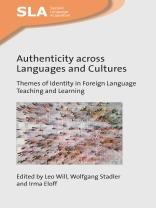This volume centres around concepts of personal and cultural authenticity as they play out in various contexts of foreign language teaching and learning worldwide. The chapters cover a wide range of contexts and disciplines, including both theoretical and empirical work; together they comprise both a rigorous analysis of authenticity in language teaching and a step away from notions of native-speakerism and cultural essentialism with which it is often associated. Written by a group of scholars working across several continents, the chapters offer diverse perspectives regarding the role language plays in processes of personal growth, learning, development, self-actualisation and power dynamics. The book addresses the theoretical and philosophical nature of authenticity while remaining grounded in the teaching and learning of languages, with authenticity viewed as a practical concern that guides our actions and beliefs. The book will be of interest to scholars, researchers and students of authenticity as well as foreign language teachers interested in the theoretical underpinnings of their practice.
विषयसूची
Contributors
Claire Kramsch: Foreword: Authenticity in Our Times
Preface: Authenticity Revisited: It’s Getting Personal
Chapter 1. Leo Will and Richard S. Pinner: The Concept of Authenticity in Foreign Language Teaching and Learning
Part 1: Authenticity and Language Teaching
Chapter 2. Wolfgang Stadler and Anna Dreher: «Что такое аутентичность»? The Concept(s) of Authenticity in Russian as a Foreign Language
Chapter 3. Matthew Dame and Natalia Dame: Multilingualism and Authenticity in Russian Heritage Language Teaching Practices
Chapter 4. Carol Spöttl, Eva Konrad, Veronika Schwarz, Elisa Guggenbichler and Benjamin Kremmel: Authenticity in Language Assessment: Revisiting the Implementation of a Key Principle
Chapter 5. Anna Shkireva: Authenticity Beyond Teaching Materials: Teachers’ Authentic Care on Students’ Persistence at the Beginner Level of Foreign Language Courses
Chapter 6. Wendy M. Whitehead Martelle: Designing for Authenticity: Making Sense of an English Pedagogical Grammar Course
Chapter 7. Maria Bondarenko: Rethinking Authenticity in SLA from the Perspective of L1 Use: A Concept of Cognitive Authenticity
Part 2: Authenticity and Identity
Chapter 8. Grit Alter: Authenticity, Curricula and Authentic Education
Chapter 9. Wietske Boon and Irma Eloff: Authenticity and the Psychology of Language and Learning During Early Childhood Education
Chapter 10. Elsabé Taljard: Authenticity in Language Teaching: An African Language Perspective
Chapter 11. Irene Heidt : When Moral Authority Speaks: Empirical Insights into Issues of Authenticity and Identity in Multilingual Educational Settings
Chapter 12. Veronika Makarova: Exploring Authenticity for an Endangered Heritage Language Context: Canadian Doukhobor Russian
Part 3: Authenticity and Aesthetics
Chapter 13. Candice Livingston and Hanlie Dippenaar: Autobiographical Fairy Tales for Authenticity in the English Classroom: A South African Higher Education Case Study
Chapter 14. Håvard Haugland Bamle: Indie-Folk Music and the Quest for First-Person Authenticity
Chapter 15. Annelise Brox Larsen: Authenticity and Literature(s) in Teacher Education: Bildung in Jigalong and Bárbmo
Chapter 16. Hanlie Dippenaar, Cheryl Logan and Candice Livingston: Authenticity and Authentic Voices in the Literature Curriculum of Pre-Service Teachers of English
Magdalena Kaltseis: Afterword: Taking Stock of the Authentic – Critical Synthesis and Timely Outlook
Index
लेखक के बारे में
Irma Eloff is a Professor of Educational Psychology at the University of Pretoria, South Africa and Adjunct Professor at the University of Innsbruck, Austria. She is the author and editor of six books and more than 90 scientific articles and book chapters. She conducts research in sustainability sciences with particular interest in quality education and good health and wellbeing.












